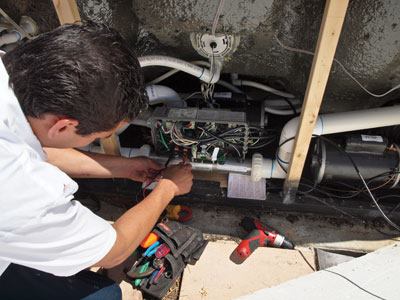Tech Support
Business is improving for many spa service companies. Unfortunately, they have out-of-work dealers and inexperienced techs to thank.

PHOTO: Erika Taylor

PHOTO: Erika Taylor
By ‘poaching’ salespeople from other fields, dealers are enjoying a new perspective on the hot tub industry.
Pool & Spa News checks in with some past winners in the spa category of our Masters of Design contest.
Hot tub dealers must understand how consumers have changed in recent years, and how to adapt.
James Sturgeon is used to receiving calls from spa owners and technicians seeking repair advice.
But he was a bit shocked recently when a customer asked him to fix a hot tub nearly 1,000 miles north in Albany, N.Y. Perhaps more surprising was the oversized — and completely unexpected — package he discovered on his doorstep a few days later.
“I asked him to send me a picture,” said Sturgeon, the owner of Alpharetta, Ga.-based Premier Hot Tubs. “Instead, I came into the shop and found this huge box waiting for me. The guy actually overnighted his entire control system.”
The frustrated customer had paid four different technicians to fix the unit and patch a crack in the heater of his 1980s-era hot tub, and finally turned to Sturgeon after all other attempts failed. Sturgeon knew right away how to fix the problem with the heater. “‘Man, you can’t patch that,’ I said. And I told him he needed a new heater tank. With something like that, it’s all you can do.” The cost to ship and repair the unit, which included replacing the heater, blower motor and relay, totaled nearly $1,000. But to the customer, it was worth every penny. “He was happier than a kitten following a leaky cow!” he recalls.
This may be an extreme example, but Sturgeon has noticed a 25 percent increase over the last two years in calls from people who couldn’t find qualified technicians to fix their equipment.
Other veteran industry members agree that these cases are on the rise.
Miguel Barajas is one of four full-time spa techs at American Spa Services in Chatsworth, Calif., a suburb of Los Angeles. Typically he has a route of four-to-six customers a day.
Barajas often finds that inexperienced techs will replace multiple parts on a spa — costing the customer hundreds of dollars — only to discover it still isn’t functioning properly. Moreover, some of these technicians will leave with a part in hand and never return, Barajas says. He attributes this to untrained pool technicians looking for a piece of the spa-pie, or former hot tub dealers who believe they can fix a spa, since they used to sell them.
But the quantity of incompetence in the field has been a boon for American Spa Services. Recently, the company added a maintenance division, and it’s considering an expansion into Orange County due to the rising number of daily calls received from that area, which is more than 65 miles away.
Across the country, Lou Vitulli, owner of V & V Spa Service in Hagerstown, Md., has observed a similar trend.
His three-man team provides repair and maintenance throughout Maryland, Washington, D.C., and Northern Virginia, an area that has seen many spa dealers close their doors. After going out of business, a number of former owners took a chance with spa service, and called old customers to land repair gigs. But when their lack of knowledge became apparent, the clients turned to companies with proven track records, Vitulli says.
Although his business has grown as a result of these “correction calls,” Vitulli would rather it not happen at all. “This problem diminishes the integrity of the service industry and makes us all look unprofessional,” he says.
The situation is compounded by ads posted on Websites such as Craigslist, where consumers shop for lower service rates. All too often, techs with little-to-no training undercut legitimate professionals by 20 to 40 percent.
“Go on Craigslist, search for spas and you’ll always see someone offering cheap repair,” says Jeff Clouser, owner of Alcoy’s Spa Service in Lindenwold, N.J. “It’s not a level playing field,” he says.

